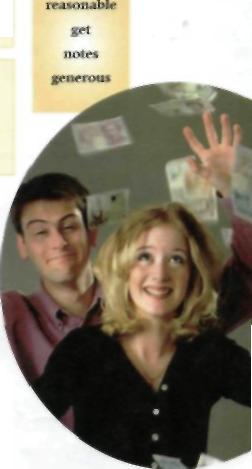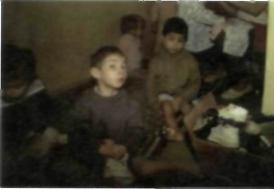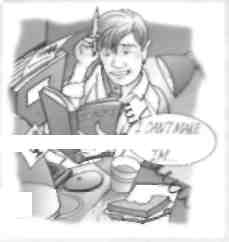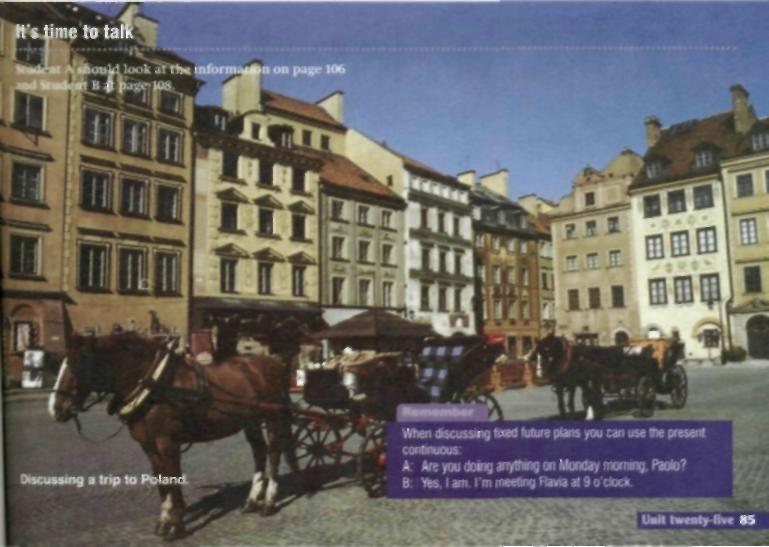
- •It's time to talk
- •12 Unit two
- •It's time to talk
- •Information
- •Vocabulary
- •It's time to talk
- •26 Unit six
- •Is there a carpark? Are There mm
- •28 Unit seven
- •It's time to talk
- •1 Remember
- •It's my kind of town
- •Vocabulary
- •It's time to talk
- •48 Unit fourteen
- •5 Sans nrOnTlBks artSfN zonder GfffWzcw
- •Vocabulary
- •Information at Arriving without luggage
- •Vocabulary
- •60 Unit seventeen
- •Ivd. DArtU/
- •Vocabulary
- •It's time to talk
- •Isabelle Segura is a pa in Neuilly, just outside Paris. She talks about her working week.
- •IvcTion pro
- •It's time to talk
- •Vocabulary
- •78 Unit twenty-three
- •It's time to talk
- •Vocabulary
- •It's time to talk
- •Vocabulary
- •It's time to talk
- •Vocabulary
- •7 Changing workspace
- •It's time to talk
- •7 Changing workspace
- •Its time to talk
- •It's time to talk
- •It's time to talk
- •Its time to talk
- •Verbs not usually in the continuous form
- •Irregular verbs
- •7 Changing workspace
- •8 The a team
- •Interviewer:
- •Interviewer:
- •Interviewer:
- •It's almost the weekend
- •7 Changing workspace
- •8 The a team
- •12 Do you salsa? I've got news for you lg 2d 3c 4h 5b 6f 7a Be
- •138 Answer key
- •Visited
- •140 Answer key
- •It's lime to talk
- •Inviting
- •142 Answer key
It's time to talk
Are you good with money?
You and your partner win €1.000.000 in the lottery. How do you plan to spend the money? Tick three of the following:
 People
and money
People
and money
I'm good with money. I'm careful with money. I'm bad with money. I'm a little mean. I'md)
Forms of money
Credit card
Stocks and shares
Bill
Coins
Change
(2)
M
O
N E Y
Verbs
To borrow money
To (3) money out
To spend money To save money To lend money
Price
How much does it cost?
€3.000 It's expensive.
€300 It's (4)
€30 It's cheap.
Now ask your partner how he/she plans to spend the money. Note down his/her answers and then turn to page 109 to find out if he/she is goad or bad with money!
A: So. what do you plan to spend the money oft? ■firstly, I plan to buWfl f^M" what elsHrJ
B: Then I want to spend some money ^mW
Learn these useful phrases about money.
Is there a cash point nearby?
Could you lend me some money?
Do you have any change'
I'd like lo change some euros.
82 Unit twenty-four
On Hie ag
Speaking Future plans
Grammar
The present continuous 2
Pronunciation
Weak stress 2
Meet Anthony started SROA - the Sels Romania Orphans Appeal and helps children in Romania.


In pairs, ask and answer these questions about the future
you doing anything special al (he weekenttfc |wa: are you doing tomoir AM
Listen to this
A job everyone wants to do
2 Listen again and answer the questions. ►►'25.1
Why did Anthony start SROA?
What was the first objective of SROA in Romania?
What is the big project for next year?
What salary do people get in SROA?
F F
1 We interviewed Anthony Allen about his work in Romania. Are these sentences true or false? >H25.1
Anthony started SROA in 1998. T
Eight people are travelling to Romania in October. T
Anthony is staying in Romania for two
Would you like to do charity work in another country?
What do you think'
weeks in October. T F
4 SROA gets most of its money from the government. T F
In Unit 16.
we looked at the present continuous for talking about temporary
situations
with the focus on the present. The present continuous is also
useful when you talk about tixed future
plans,
especially for travel and meetings. Complete
the questions and answers below.
Positive
We're driving to Romania.
We
(2) staying
for two
weeks.
Question
What are
you (1) next
month?
How long are you staying?
No. they
(5)
Grammar
retmnce pages 11&-17
![]()
![]()
![]()
Questions t short answers
(3) you driving to Romania?
Are they flying in October?
Yes,I(4)
Yes. they are.
Negative
We're not flying.
two weeks.
We're not staying longer than
No. I'm noL
Unit twenty live 83
Do it yourself
1 Correct the mistakes in these sentences.
I giving a presentation next week.
Are your boss coming to the meeting?
Do you going to the theatre tonight?
I'm not come to the theatre tonight. I'm tired.
2 Anna is a local project manager in Romania. Anthony rings her to discuss the hospital project for next year. Complete their conversation with the correct form of the present continuous.
anthony: Anna, it's Anthony. I just wanted to discuss the hospital schedule and check you agree with everything.
anna: Sure. Go ahead.
anthony: OK. (1) (we / not / meet) the architects in October.
(2) (We / see) them in November instead.
an na: Right. So (3) (when / you J go) to Bucharest for the meeting
with the government officials?
anthony: On 18th December. And just before that, on December 14th. (4)
(we / run) a seminar to inform everyone in SROA about the project. (5) (you / still / come) to England next year?
anna: Yes. in January.
anthony: Good. Well. )6) (we / have) a tour of my local hospital at the
end of January to meet some doctors who are part of the project. I think that's everything.
anna: Good. See you soon.
Now listen and check. ►W25.2
3 You received this email from your boss this morning. Write a reply using the notes on page 109. Where possible, use the present continuous.
S & B 9 J* Ifc
Send Now Send Later Save as Draft Add Attachments Signature Contacts Check Names
1
I need some information about the workshop asap. Please email me with the following info:
1 Participants
Are these people still coming or have some of them cancelled: Anna Parkland, Herald Henrikssen, John Maier?
2 Sneakers
Please check who is definitely speaking. I don't have a confirmed list of speakers.
3 Evening programme
What are we doing in the evenings? I have no information!
Please send me the information by the end of today.
Many thanks
Kim
With a partner, compare your emails. Can you correct any grammar mistakes?
84 Unit twenty-five
 </*
</*
Weak stress 2
Listen to the pronunciation ot two questions. Which one sounds more natural? >H25.3
As we saw in Unit 10. unstressed words are olten pronounced with the schwa 'a . Using the schwa correctly is very important tor your understanding and pronunciation. Listen and write down the questions you hear >H25.4
A: What
B: I'm going to Poland.
A: Poland? What
B: I'm visiting a friend.
A: How
B: Just for a tew days.
A: When
B: Next Friday.
A: Are
B: Yes. I'm going camping.
Listen again and underline all the examples ol the schwa. ►H25.4
With a partner, practise saying the dialogue.

Amy
Harrison
is an ^exhibitions
manager
in-
the
USA. She had sffmgi problems
on ber-tefr-.
trip
to
Pennsjilvania. in
Ih
in
Ih
Speaking
Solving work problems
